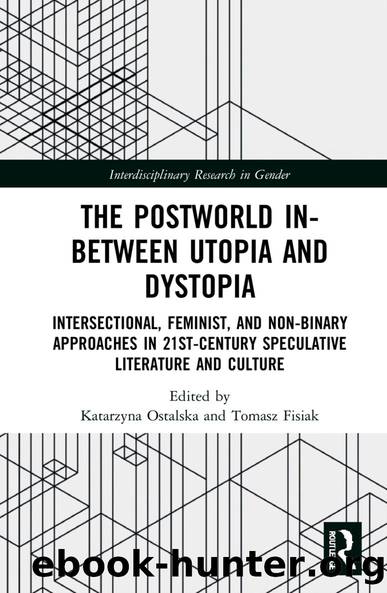The Postworld In-Between Utopia and Dystopia by Katarzyna Ostalska Tomasz Fisiak

Author:Katarzyna Ostalska, Tomasz Fisiak [Katarzyna Ostalska, Tomasz Fisiak]
Language: eng
Format: epub
ISBN: 9780367537043
Google: m1qLzgEACAAJ
Publisher: Routledge
Published: 2021-12-30T01:02:18+00:00
The repressive politics of the spectral father and beyond
Following the transformation of the primal father into his spectral double, in Totem and Taboo Freud tells us that the violence of the state of nature, instinct, and drive were sublimated into the structures of patriarchal civilisation. From a Freudian point of view, it is possible to find perhaps the earliest example of the story of sublimation in Platoâs Republic, where the philosopher develops a pre-psychoanalytic theory of political psychology and the division of the self between reason and the passions. According to Plato, it is essential that reason controls the passions in order to ensure that men (because it is always men who think in Plato) are able to think clearly and make decisions about the city in a reasoned and clear-headed manner. In Platoâs best possible city, the utopian republic, the most reasonable men, the philosopher kings, steer the ship of state in such a way that the passions never take control and lead the city in the wrong direction. However, we know that apart from being the best classical example of the utopia of reason, the Republic is also a story of the dangers of the passions and the potential decline of the city. If the republic represents the best possible city, Plato is clear that this utopia contains the possibility of decline through timocracy, where the strongest rule; oligarchy, where the richest take charge; democracy, where everybody has a say; and finally tyranny, where one man rules the city on the basis of his own passions and crowd-pleasing strategies designed to keep the people on his side. While the republic is a utopia by virtue of the philosophersâ ability to impose reason upon their embodied passions, the problem of tyranny is that the passions are in charge and the ruler makes decisions on the basis of instinct, drive, and a lust for power. In this respect, it is possible to make the case that where the philosopher resembles a kind of Proto-Freudian spectral father, who is somehow able to overcome his instinctual drives in the name of his own psychological order and the greater good of the city that works like a kind of machine, the tyrant represents his flesh and blood twin before the leap to civilisation ever took place and there was a division between the law and criminal behaviour.
By contrast to Freud, who, in Totem and Taboo, starts in the state of nature and works forward from the pre-historic tyranny of the primitive father to the historical world of the spectral father and civilisation, Platoâs story in the Republic starts from the pre-historic Homeric golden age of heroes and tells a tale of historical decline and collapse towards tyranny that he hopes to solve through the design of his utopian city. The difference between the two narratives, and particularly the direction of travel they suggest with regard to historical change, can probably be explained by the 2,500 years separating Platoâs ancient idealism concerned with how
Download
This site does not store any files on its server. We only index and link to content provided by other sites. Please contact the content providers to delete copyright contents if any and email us, we'll remove relevant links or contents immediately.
Cecilia; Or, Memoirs of an Heiress — Volume 1 by Fanny Burney(32546)
Cecilia; Or, Memoirs of an Heiress — Volume 2 by Fanny Burney(31945)
Cecilia; Or, Memoirs of an Heiress — Volume 3 by Fanny Burney(31929)
The Great Music City by Andrea Baker(31916)
We're Going to Need More Wine by Gabrielle Union(19034)
All the Missing Girls by Megan Miranda(15957)
Pimp by Iceberg Slim(14488)
Bombshells: Glamour Girls of a Lifetime by Sullivan Steve(14057)
For the Love of Europe by Rick Steves(13908)
Norse Mythology by Gaiman Neil(13348)
Talking to Strangers by Malcolm Gladwell(13347)
Fifty Shades Freed by E L James(13232)
Mindhunter: Inside the FBI's Elite Serial Crime Unit by John E. Douglas & Mark Olshaker(9322)
Crazy Rich Asians by Kevin Kwan(9277)
The Lost Art of Listening by Michael P. Nichols(7494)
Enlightenment Now: The Case for Reason, Science, Humanism, and Progress by Steven Pinker(7306)
The Four Agreements by Don Miguel Ruiz(6744)
Bad Blood by John Carreyrou(6611)
Weapons of Math Destruction by Cathy O'Neil(6265)
